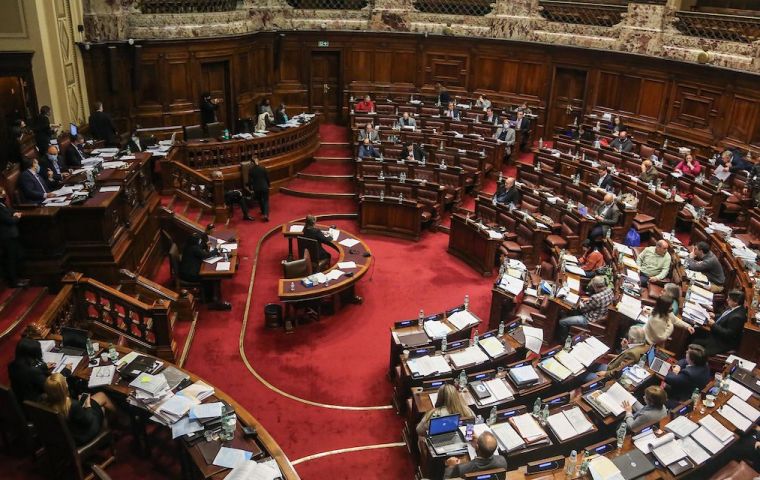MercoPress. South Atlantic News Agency
Uruguay's Lower House passes euthanasia bill
 The extraordinary session had 18 hours of debate before the bill, introduced in 2020, was formally voted on.
The extraordinary session had 18 hours of debate before the bill, introduced in 2020, was formally voted on. Uruguay's Lower House Thursday passed a bill legalizing euthanasia with 57 votes out of 96. The project now goes to the Senate for further Parliamentarian treatment.
The initiative of the Colorado Party deputy and president of the Lower House, Ope Pasquet, unified with the text presented by the opposition Frente Amplio, was approved by 57 votes to 96, and generated divisions within the government center-right wing coalition.
The extraordinary session had 18 hours of debate before the bill, introduced in 2020, was formally voted on.
“We are consecrating a right that puts our social and human rights legislation at the forefront worldwide,” Congressman Felipe Schipani of the Colorado Party said in a TV interview.
“There are seven countries in the world that have regulated the Institute of Euthanasia and today we approved the half sanction in the House of Deputies, the Senate is still pending, but, presumably, there will also be votes for its approval and thus Uruguay joins that group of first world countries that have regulated this Institute,” he added.
Different voices despite political alliances
National Party deputy Rodrigo Goñi, one of the main voices speaking out against the initiative, said that “the answer to this bill is that the remedy is worse than the disease.”
“Why? First because it does not alleviate. If what we are really looking for is to alleviate suffering, it does not alleviate, it kills it,” he said.
Pasquet, in response to this, asked what is to be done with the people “who are suffering today”, the people who “will not have palliative care, neither tomorrow, nor the day after, nor on Monday”.
“Living is a right and everyone has that right That some do not want to do it, of course, is totally. That on this there are, as there are, notoriously, different opinions and different sensitivities, totally legitimate. But for that very reason, that everyone has a say and that everyone can decide about his or her own life. That is what we are defending, the right of each one to decide about his own life”, concluded the deputy who promoted the original bill.
Schipani argued that euthanasia “is fundamentally inspired in the freedom of people and in deciding how to die, deciding to die with dignity and not to prolong suffering unnecessarily.” He said Thursday's decision was “historic.”
“That is the basic philosophical debate on the subject: those who understand that we are the people who have to decide about our life and the end of it and those who believe that it is not the individual who has to decide to put an end to his life,” he also pointed out. In Schipani's view, euthanasia “is a matter of convictions, waves, and philosophical roots.”
Regarding the bill's future in the Senate, the Congressman said he believed “there is a majority of votes for it to become a law”.
Opposition Broad Front Chairman Fernando Pereira argued that “those of us who have a faith option cannot demand those who do not have it to proceed in the same way.”
“I come from a difficult time, my mother passed away from a hard terminal illness, she was a Christian and so was I, and we did it according to what she thought, but I understand very well those people who want to opt for another path because I saw the last days of her life,” he went on.
“This law does not take away the right of my mother to do what she decided, it gives the right to the one who does not want to be able to do it, then from my point of view a good law was passed,” he explained. “There are moments in life in which dignity is at the limit,” he added.
Meanwhile, the Archbishop of Montevideo, Cardinal Daniel Sturla, said he hoped President Luis Lacalle Pou would veto the bill if it makes it through the Senate.
“A clear setback in the recognition of the dignity of all human life has just been voted by the majority of deputies,” said Sturla. “The culture of discarding and death advances,” he added.
The bill was a joint initiative from the Colorado Party and the Broad Front.




Top Comments
Disclaimer & comment rulesCommenting for this story is now closed.
If you have a Facebook account, become a fan and comment on our Facebook Page!